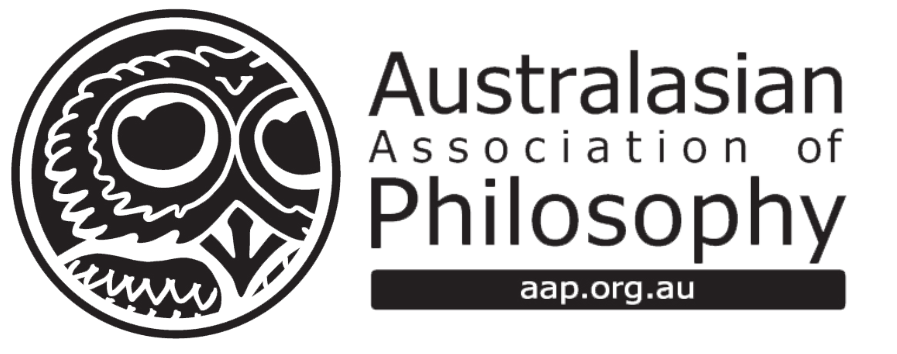
Australasian Journal of Philosophy Best Paper Award
From 2007 until 2019, the AAP, in connection with Taylor and Francis (Routledge Imprint), awarded an annual prize for the best paper published in the Australasian Journal of Philosophy in the previous year.
2019

'Meriting a Response: The Paradox of Seductive Artworks'
Australasian Journal of Philosophy Volume 97, Issue 3
This is an extremely clear paper, beautifully written. It is demanding, but also satisfying. The paper discusses the underexplored topic of seductive artworks. These are artworks which are meant to elicit a response in their appreciators, before eliciting a second-order response that repudiates it. Stear cogently argues that such artworks present a problem for the 'Merit Principle' about the aesthetic value of artworks; a principle according to which intending to elicit an unmerited response is an aesthetic flaw. On the one hand, it seems that all seductive artworks will have this feature but, on the other hand, it does not seem that all seductive works are aesthetically flawed. Stear resolves this tension by modifying the merit principle. The key to this modification is the consideration of the aesthetically worthwhile constraints under which artworks operate.
The paper sets up the merit principle well. It shows its plausibility and attractiveness. The paper also shows originality identifying seductive artworks, and the novel paradox that emerges. It sets up the problem that seductive artworks raise for the merit principle clearly, in the form of an inconsistent triad, and it genuinely tries to understand the principle instead of attempting to demolish it. A number of different ways of resolving the inconsistent triad are considered and rejected, in an engaging discussion which is peppered with illustrations and examples that bring the topic to life. Eventually, a new merit principle is proposed. The new principle is well motivated by the idea that all artworks operate under constraints which limit their capacity to exemplify certain aesthetic qualities; an idea also well illustrated with examples.
2018

'Temporal Experiences Without the Specious Present'
Australasian Journal of Philosophy Volume 96, Issue 2
Valtteri Arstila’s “Temporal Experiences without the Specious Present” offers a sophisticated, empirically informed, defence of the dynamical snapshot view of temporal experience. This is the view that our experiences have neither objective, nor subjective, temporal extension. In the context of the current literature, this is a bold claim. Almost all contemporary theories of temporal consciousness suppose that the contents of our temporal experiences are temporally extended and temporally structured. They either hold that our experiences are themselves temporally extended, or that although the experiences themselves have no temporal extension, their content is both temporally extended and structured. In either case, our experiences in some good sense seem to have subjective duration and temporal structure. These views have dominated the literature for decades, in large part due to the belief that only a view of this kind can accommodate our being able to perceive motion and change. Arstila’s paper brings a rich array of empirical evidence in psychology and neuroscience to bear on this issue, in order to argue for the dynamical snapshot view: a view that denies the dominant assumption that our experiences have (at least) subjective duration. A crucial, and intriguing, aspect of the defence of the dynamical snapshot view is Arstila’s argument that experiences of change and motion can occur without an associated phenomenology of things being different at different times. This is a surprising, and initially counterintuitive view: it might seem obvious that we see change, and motion, by seeing that something is first one place, and then another; first one way, and then another. Arstila carefully argues for this view by appealing to an impressive array of empirical evidence which suggests that our awareness of both change and motion consists in the function of (in each case) two separate mechanisms: one pair of which generate the experiences of sensed change and sensed motion—the feeling that something has moved, and has changed—and two other mechanisms that generate the experience of seen change and seen motion—the feeling of something having been in a different places at different times, or having been different at different times. These two kinds of experiences, argues Arstila, can, and do, come apart. That is why we can have experiences of pure change or motion without any associated experience of something having been in different places, or been different at different times. It is this pure change and motion that the new dynamical snapshot model so elegantly accommodates. As such, Arstila’s paper stands out as a particularly successful example of empirically informed philosophy, and one that can be expected to radically change the framework from within which we theorise about our temporal experiences.
2017

Jennifer M. Morton
'Reasoning under Scarcity'
Australasian Journal of Philosophy Volume 95, Issue 3
tandfonline.com/doi/abs/10.1080/00048402.2016.1236139Jennifer M. Morton’s “Reasoning under Scarcity” offers a sophisticated, empirically informed defense of a surprising thesis about norms of practical rationality: under conditions of extreme scarcity, patterns of reasoning that consistently undermine an agent’s long-term goals can be rational. For instance, an agent stuck in a debt trap because she privileges her short-term interests could nonetheless be reasoning exactly as she ought to reason. This surprising normative position has broad-reaching implications for public policy debates, shifting blame and responsibility from individuals in extreme poverty to policy-makers in conditions of relative affluence. In making the case for this position, Morton challenges the dominant view in action theory that rational requirements governing means/end reasoning (if there are any) are universal and context-independent. Morton follows in the footsteps of psychologists like Gerd Gigerenzer, who have argued that human reasoning does not conform to ideal rational choice theory and that our heuristics should be evaluated as rational insofar as they make a reasonable trade-off between cognitive efficiency and accuracy. But Morton does not see privileging of short-term interests as just a quick and dirty heuristic that imperfectly meets the agent’s goals. Instead, Morton draws on recent developments in the empirical literature to argue that we face a trade-off in our capacity to reason efficiently about short-term goals versus long-term planning: under conditions of extreme scarcity we are better at evaluating short-term choices, but worse at balancing them short-term versus long-term interests. Given this cognitive constraint, Morton argues that in conditions of extreme scarcity, where a bad choice could be disastrous, it is rational to form a habit of privileging short-term methods. Crucial to this argument is the idea that habits, intentions, or policies can ground rational requirements that may diverge from what we have most overall reason to do. The paper is written in a lively and accessible way and filled with compelling examples from everyday life. Morton’s paper stands out as a particularly successful instance of public philosophy: it successfully brings both nuanced philosophical understanding and empirical research to bear on issues of broad public interest in a way that that will spark the interest of philosophers, policy makers, and the general public alike.
2016

'How to be a Bayesian Dogmatist'
Australasian Journal of Philosophy Volume 94, Issue 4
Epistemologists have often thought that there is an underlying conflict between Bayesianism, an influential theory of consistency for partial belief states, and Dogmatism a popular fallibilist theory of how to respond appropriately to experience in a way that sidelines skepticism. Instead of calling for a reevaluation of these views, Brian T. Miller’s “How to be a Bayesian Dogmatist” offers a sophisticated yet surprisingly accessible reconciliation that leaves readers with a far better understanding of Bayesianism and a deeper appreciation of its relevance to debates in epistemology.
2015

‘Instance Is the Converse of Aspect’
Australasian Journal of Philosophy Volume 93, Issue 1
Boris Hennig's paper "Instance Is the Converse of Aspect" tackles the venerable problem of what it is for an individual to instantiate a property, investigating what Hennig calls "aspect theories" of instantiation, according to which particulars instantiate universals in virtue of their sharing "aspects" with the universals. His starting point is Donald Baxter's aspect theory, but before long the paper dives into the history of philosophy, consulting Aristotle, Porphyry, William of Champeaux, and several other medieval and contemporary philosophers in pursuit of the best possible implementation of the aspect approach. This implementation, a version of medieval indifferentism, is briefly sketched in the final pages. The paper treats the ancient and mediaeval philosophers as interlocutors rather than as objects of historical study, offering in the course of its breakneck journey through the centuries a compelling case for the synergy of historical scholarship and philosophical reasoning. The command of the material is virtuosic and the approach deeply rewarding. Though it does not attempt to defend the aspect approach against its rivals, the paper makes a significant contribution to the theory of instantiation by finding and developing the aspect approach's best strategy for philosophical success.
2014

Roy Sorensen
'Parsimony for Empty Space'
Australasian Journal of Philosophy Volume 92, Issue 2
2013

Alex Barber
'Science's Immunity to Moral Refutation'
Australasian Journal of Philosophy Volume 91, Issue 4
2012

Matthew Ratcliffe
‘What is Touch?’
Australasian Journal of Philosophy Volume 90, Issue 3
2011

Josh Parsons
‘Assessment-Contextual Indexicals’
Australasian Journal of Philosophy Volume 89, Issue 1
2010

Jeff Speaks
'Epistemic Two-Dimensionalism and the Epistemic Argument'
Australasian Journal of Philosophy Volume 88, Issue 1
2009

William G. Lycan
'Giving Dualism its Due'
Australasian Journal of Philosophy Volume 87, Issue 4
2008

Stephen Finlay
'The Error in the Error Theory'
Australasian Journal of Philosophy Volume 86, Issue 3
2007

Jonathan Schaffer
'From Nihilism to Monism'
Australasian Journal of Philosophy Volume 85, Issue 2
2006

John Heil
'The Legacy of Linguisticism'
Australasian Journal of Philosophy Volume 84, Issue 2
